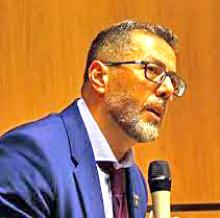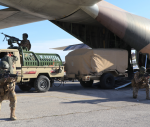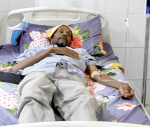You are here
The Palestinian bubble and the burning of Ali Dawabsheh
Aug 04,2015 - Last updated at Aug 04,2015
One-and-a-half-year-old Ali Dawabsheh became the latest victim of Israeli violence on July 31. He was burnt to death. Other members of his family were also severely burnt in a Jewish settlers’ attack on their home in the village of Duma, near Nablus, in the West Bank.
A spokesman for Rabbis for Human Rights told Al Jazeera Arabic that this is the 10th attack on Nablus by settlers in July. A statement issued by the Palestine Liberation Organisation (PLO) provided an even more alarming statistic, putting the number of Jewish settlers’ attacks, some of them lethal, at an estimated 11,000 since the end of 2014.
Ali is not the first Palestinian child to be burnt to death, although the story of Mohammad Abu Khdeir who was tortured and burnt alive by a group of Jewish extremists in July 2014 now serves as a hideous benchmark for Israeli settler violence, which is often conducted under the watchful eye of — or as part of larger violent campaign led by — the Israeli army.
Despite Israeli political theatre and statements of condemnations following Abu Khdeir’s grisly murder, Israeli violence against Palestinians is part and parcel of Israel’s occupation policy, draped in numerous crimes gone unpunished.
Little Ali is no different from the 490 children killed in Israel’s war on Gaza last summer, in which some 2,200 Palestinians died, mostly civilians. The Dawabsheh family home, which was completely burnt, (while Ali’s mother, father and brother, Ahmed, all sustained serious burns) was no different from the 20,000 Gaza homes which — according to the UN — were destroyed during the Israeli carnage in the strip.
The West Bank and Gaza, despite physical separation and Palestinian factionalism, are united by a rapport of suffering and a trail of blood that proves stronger than the Hamas-Fateh dispute. They are also united in the perception of Israel, which sees Ali and all Palestinian toddlers as a demographic threat to the “Jewish identity” of the state.
In its statement, the PLO held Israel “fully responsible” for Ali’s murder and the burning of his family and their home. The “brutal assassination” of Ali is “a direct consequence of decades of impunity given by the Israeli government to settler terrorism”, said PLO official Saeb Erekat.
Of course, the statement is accurate, and if these words were uttered by anyone other than the “chief negotiator” of the Palestinian Authority (PA), one could have taken them seriously. Alas, such statements only highlight the duplicity and contradiction of the official Palestinian position. In fact, one cannot help but feel that the PA is partly responsible for Ali’s death. The reasons are as follows.
Israel’s impunity is encouraged by many factors, including US-Western backing and the lack of international will to hold Israel — government, army and settlers — accountable for their crimes. But that impunity is also encouraged by the Palestinian leadership itself, which lives in a massive political and economic bubble in Ramallah, in the West Bank.
Erekat is a resident of the Ramallah bubble. His job consists of two main aspects: to sustain the charade using all the right sounding words, that the PA and Israel are locked in some sort of a perpetual conflict (although they are not) while concurrently working closely with Israel to ensure the survival of the PA.
The PA cannot exist without Israeli support, as Israel’s military occupation and illegal settlement expansion cannot be sustained without the security arm of the PA, which has suppressed any serious resistance to Israel in the West Bank. Using “security coordination”, the PA apprehends any Palestinian who dares pose a threat, real or imagined, to the Israeli occupation and the settlers.
In other words, the PA helps in ensuring the safety of the settlers, like those who killed Ali and many others like him.
Naturally, facing little or no resistance, the settlements are growing. The latest planned expansion was just announced by Israeli Prime Minister Benjamin Netanyahu, who plans to construct hundreds of new illegal housing units on confiscated Palestinian land, in the Jewish settlements of Pisget Ze’ev, Ramot, Gilo and Harhoma in Jerusalem.
In his statement, Erekat did not forget to link this to the murder of Ali: “We cannot separate the barbaric attack that took place in Duma last night from the recent settlement approval by the Israeli government, a government which represents an Israeli national coalition for settlements and apartheid.”
But he, along with his boss, Mahmoud Abbas, intends to do nothing about it. On the contrary, despite his and other PA officials’ fiery statements, the constant message the PA, in actuality, sends to Israel is that Palestinians are okay with the status quo, and business will carry on as usual, burnt babies or not.
Consider this as an example: the PA Central Council voted in March to halt negotiations and security coordination with Israel. The decision, meant for public consumption mostly, hardly mattered, as top PA officials, including Erekat himself, reportedly held “secret” talks with Israeli government officials in Amman recently.
“Sadly the PLO Executive Committee and Palestinian leaders know about such meetings only from the Israeli media,” Tayseer Khalid, of the Democratic Front for the Liberation of Palestine, told Maan News Agency.
“Sadly”, indeed, especially since the meeting was designated as a “trust-building” strategy (a clue that America had a hand in it), and which included Erekat and Israeli Interior Minister Silvan Shalom.
But that, in fact, is the actual PA strategy in all of its deficiencies and contradictions. The cornerstone of that strategy is to sell as many brands, no matter how conflicting, to different groups of people for the sake of self-preservation. Erekat is, perhaps, often the scapegoat, since he is the most visible face of the PA apparatus but numerous others, too, are implicated in selling mirages to the Palestinian people, while taking part in preserving the very violent occupation that is destroying Palestinian society, robbing it of land, water and dignity.
A few hours after Ali’s murder, PA officials were scheduled to line up in Ramallah, in front of Abbas, as four new ministers were being sworn in. The revamping of the so-called unity government took place without the approval of Hamas, thus hammering the last nail in the Palestinian unity coffin which never actualised, to begin with.
The four new ministers, who ultimately have no real authority under the rule of the Israeli occupation, will read Al Fatiha (verses of the Koran) on the soul of Palestine’s latest “hero martyr”, little Ali. Real or fake tears shed by one or more officials might be highlighted in the Ramallah media to accentuate the emotional bond between the Ramallah bubble and all Palestinians. The charade will carry on for a few more months or years, where the PA will fight against the occupation using every word available, and fight for the occupation using every means available.
This is the sad tale of the Palestinian leadership and its Ramallah bubble, which is yet to burst.
The writer, ramzybaroud.net, has been writing about the Middle East for over 20 years. He is an internationally syndicated columnist, a media consultant, author of several books and the founder of PalestineChronicle.com. His latest book is “My Father Was a Freedom Fighter: Gaza’s Untold Story” (Pluto Press, London). He contributed this article to The Jordan Times.













